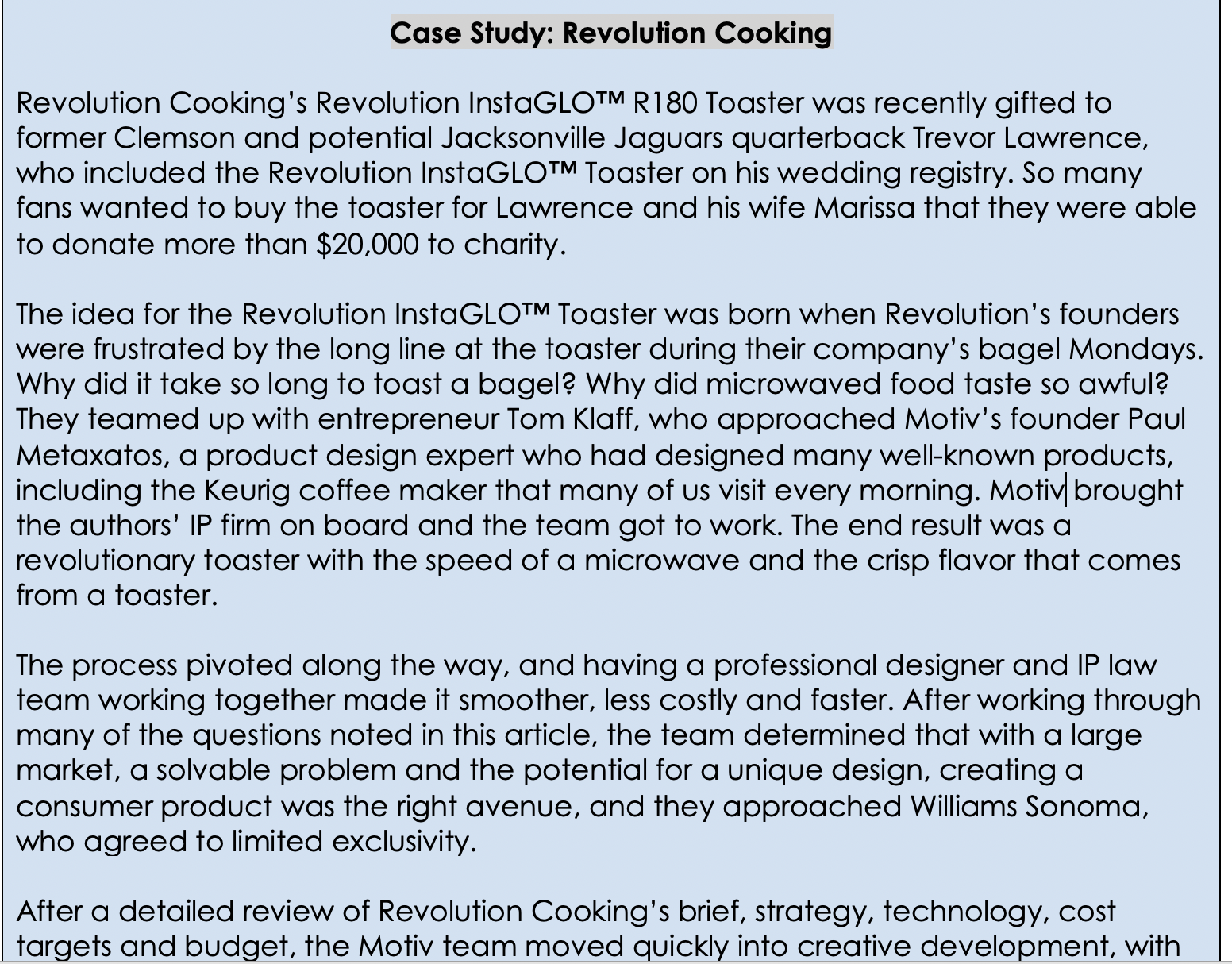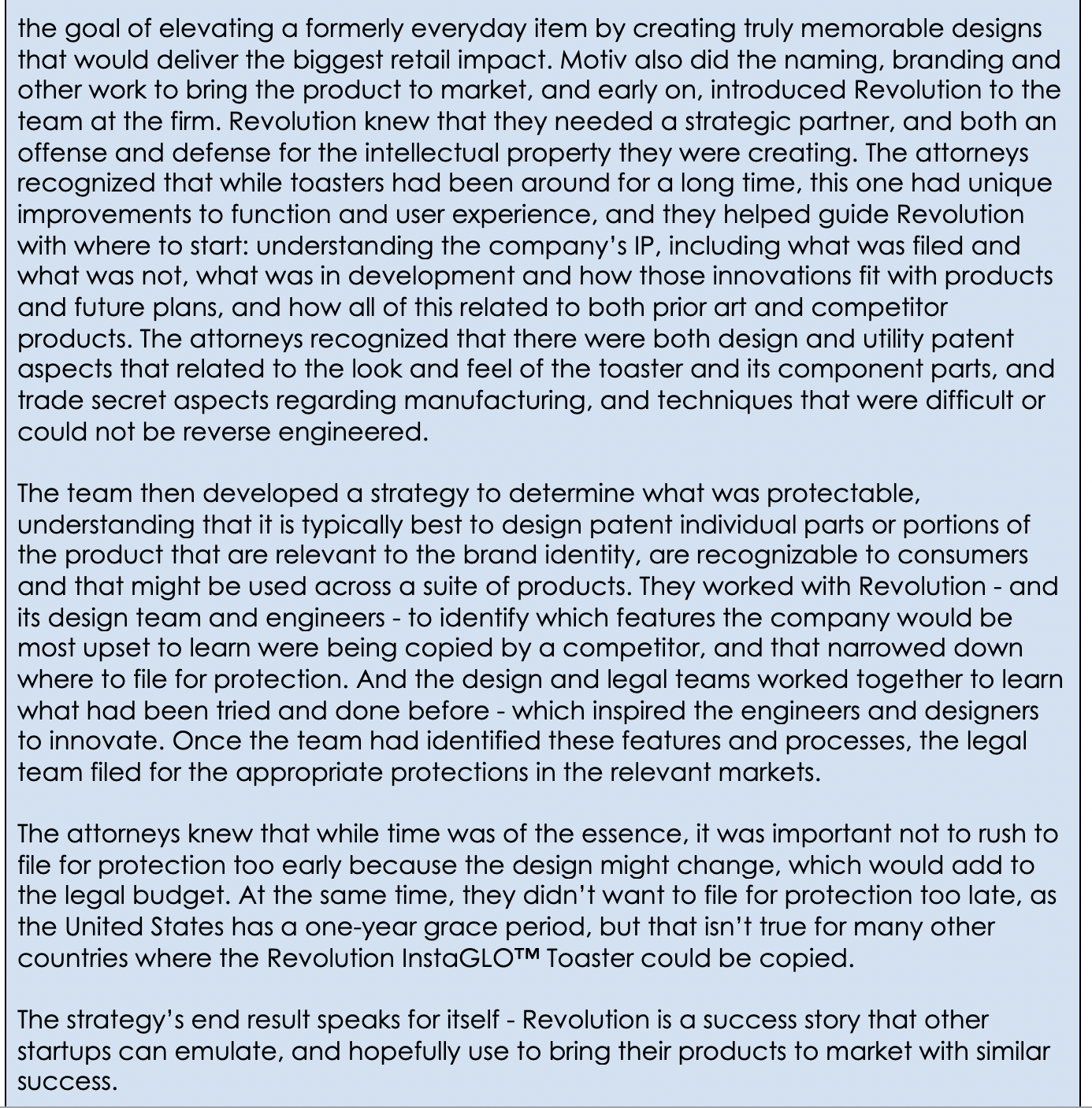“Many startups make the mistake of ignoring the value of non-patent intellectual property…. A company’s brand can be immensely valuable in the marketplace.”
Although it may seem like the name “startup” says it all, the reality for many inventors, engineers and companies is that it’s difficult to know where to start when what you have is just an idea for a product, a recently discovered process or an innovation. You may have the “million dollar idea,” but where do you start to move it from concept to market?
Step 1: Build Your Team
 While startups may be selling wildly different products, or developing different processes or innovations, one thing most have in common is a similar starting point, and a limited budget. Product design, branding and identity are always necessary, and protecting your brand, innovations and products from competition is essential. But how do you allocate your limited resources while developing the best possible brand and product, and ensuring that your intellectual property is adequately protected?
While startups may be selling wildly different products, or developing different processes or innovations, one thing most have in common is a similar starting point, and a limited budget. Product design, branding and identity are always necessary, and protecting your brand, innovations and products from competition is essential. But how do you allocate your limited resources while developing the best possible brand and product, and ensuring that your intellectual property is adequately protected?
The first step is to build your team as early as possible, and that means involving an intellectual property attorney and a product designer right from the start. Having them work closely together will save you money and time, and can also help you identify what you need to raise for capital. While the product design idea might be terrific, the IP attorney might also understand that it cannot be legally protected, or might run afoul of other’s IP rights and needs to be rethought. Or her experience may tell her that a brand name won’t translate in a different international market, or that a product cannot be marketed or protected there, and she can work with the design team to help make necessary changes. The product designer will be able to coordinate with the patent and trademark attorneys to be ready to pivot – or to change design before it’s even started based on legal parameters. Those experienced with startups understand that this isn’t a linear process – it’s more of a constantly evolving continuum, and having both the design and legal experts on board early is essential.
Step 2: Ask the Right Questions
Knowing the right questions to ask also saves time and much needed capital. If you are looking to hire IP attorneys and a product designer, these are the questions you’ll want to hear from them.
From a product design perspective, the following questions should be asked when a startup arrives with an idea or a prototype:
- How will it be sold?
- Is it scalable?
- What is the market for the product (and is there a market for it)?
- Who will buy it?
- Will the purchaser be the end user?
- How can we make the product stand out visually?
- Are you willing to switch strategies and pivot if necessary?
As an IP attorney working with both the client and product designer, these questions should also be answered early on:
- What was the motivation for the innovation?
- What is its “story?”
- What problems does the innovation or product solve – and how were those issues solved in the past?
- Has the innovator worked with anyone else, or told anyone else about it?
- In which markets will the product be sold?
- Who are the competitors?
- Has the startup sought funding, and if so, what issues has the company faced?
- What is the brand name associated with the product?
Step 3: Design and Legal Protection
Once these questions are answered and explored, the design and branding becomes more developed. At this stage, the attorneys can focus on whether the invention or product is patentable, and whether there are any blocking patents that could prevent freedom to operate. Answering essential questions early allows the patent attorneys to begin to work on a comprehensive patent application that can serve as a launching point for multiple patents during its lifetime. This is an agile approach that provides the startup the ability to pivot and shift gears when unplanned market forces come into play (such as competitors, investors, manufacturing challenges, etc.). A willingness to pivot is essential in order to obtain commercially meaningful protection for an innovation – and it often spurs innovation that makes the product truly unique.
From the design perspective, once the functionality and design have been locked in, the product designer will begin to refine the product and positioning materials, and will start the branding process, including naming and logo design. Having the designers and attorneys working together at this stage is crucial in order to keep the process moving. For example, the attorney would work with the branding team to ensure that the branding is clear from a freedom to operate perspective, and would then begin to seek protection for the brand and logo.
During the lifecycle of a typical startup, several different types of intellectual property protections may be sought, including:
- Utility patents, which protect the structural and functional aspects of a new or improved product or system. These are the most popular type of patent, and while they are significantly more expensive than design patents, they offer a broader scope of protection.
- Design patents, which cover the unique appearance of an item.
- Trademark protection, which can cover the corporate name as well as names, symbols, logos, and other design elements associated with the product.
- Trade secret protection – which, although it costs nothing, prevents access to the valuable secrets your business has worked hard to discover. Trade secrets can be protected via non-disclosure agreements, limiting access to those who “need to know,” and keeping manufacturing behind closed doors.
Your IP attorney will discuss other important considerations with you – including timing. For example, both utility and design patent protection can be lost if you disclose your idea before filing your application (in the United States, you have one year to file your application after public disclosure – but the same is not necessarily true in other countries). And because patent applications can take a while to work their way through the patent office and process, you may want to consider expediting the process if obtaining a patent early is necessary. Finally, conducting patentability searches and considering who invented the concepts (as not all who participated will be considered “inventors” legally) are important steps in protecting your product, process or system. All of this may seem daunting, which brings us back to the concept of involving IP and design experts early in what will hopefully be your successful journey from idea to market.
Step 4: Branding Considerations
Many startups make the mistake of ignoring the value of non-patent intellectual property. While patents can be incredibly valuable, patentability does not necessarily ensure that a company’s product is a good product or that it will sell well. A company’s brand can be immensely valuable in the marketplace.
Integral to branding are trademarks, which identify and distinguish a company’s products. A trademark can be a word, symbol, slogan, design, or any combination of these. You will want to choose a trademark that is reflective of your value proposition and that is distinctive, yet easy to remember, so that it builds a strong association between your mark and your products. Typically, the more unique, the stronger the mark; descriptive names, surnames, and geographic names should be avoided.
Importantly, registering a business name with your state does not create (or protect) your trademark rights. Startups should make sure their name and any logos are cleared for commercial use prior to commercial launch. Comprehensive trademark searches are an important first step in the trademark process and are strongly recommended in most, if not all, cases. If the terms and/or logos you are considering are available to use, you should try to register them as trademarks. In addition to preventing competitors from taking or using the company’s name (or your product names), trademarks help a young company create a unique and identifiable brand, building both visibility and value.


Image Source: Deposit Photos
Author: dashadima
Image ID: 30399737

![[IPWatchdog Logo]](https://ipwatchdog.com/wp-content/themes/IPWatchdog%20-%202023/assets/images/temp/logo-small@2x.png)



![[Advertisement]](https://ipwatchdog.com/wp-content/uploads/2024/04/UnitedLex-May-2-2024-sidebar-700x500-1.jpg)
![[Advertisement]](https://ipwatchdog.com/wp-content/uploads/2024/04/Artificial-Intelligence-2024-REPLAY-sidebar-700x500-corrected.jpg)
![[Advertisement]](https://ipwatchdog.com/wp-content/uploads/2024/04/Patent-Litigation-Masters-2024-sidebar-700x500-1.jpg)

![[Advertisement]](https://ipwatchdog.com/wp-content/uploads/2021/12/WEBINAR-336-x-280-px.png)
![[Advertisement]](https://ipwatchdog.com/wp-content/uploads/2021/12/2021-Patent-Practice-on-Demand-recorded-Feb-2021-336-x-280.jpg)
![[Advertisement]](https://ipwatchdog.com/wp-content/uploads/2021/12/Ad-4-The-Invent-Patent-System™.png)






Join the Discussion
5 comments so far.
George
May 2, 2021 12:46 pmModerator, please delete comment #3 as it is now redundant.
George
April 30, 2021 10:47 pmYou have all ‘very carefully’ avoided talking about the elephant in the room, which is the amount of money you already have to have BEFORE launching any startup or even getting a patent.
No one is going to ‘lend you’ that money! No one is going to ‘give you’ that money (except maybe your mother), at least the way innovation and new business startups are funded now. So, the elephant in the room is THAT problem, NOT the ‘idea’, ‘legal’, ‘business plan’, ‘patent’ or ‘organization’ problem. And . . . no . . . VC’s, ‘Angels’, ‘nice companies’, the government and rich investors won’t give you a dime to do any of that!
Of course we now have KickStarter, Indiegogo, GoFundMe that can help ‘sometimes’ but until Congress and the SEC allow ‘ordinary people’ to invest in anything they want. we won’t have a revolution in how this is done in America, and that’s really bad news, when it comes to competing with China that is already turning out 10x more STEM trained people (including 10x more PhD’s than the U.S.).
The same advice that would-be entrepreneurs have been getting for decades now (literally the VERY SAME advice) won’t help us compete with the Chinese (and others). What we need is a REVOLUTION IN FUNDING startups and new technologies that can allow even the smallest new enterprise to ‘leapfrog’ even the biggest corporations and make VC’s and ‘Angels’ BEG to get in on the latest and greatest ‘new thing’!
If RobinHood can make tired old GameStop take off again, then imagine what allowing ‘ordinary Americans’ to invest in anything they want could do! Look what it’s done for Bitcoin!
Waiting for public companies to do something new – once in a while – takes far too long now! We need to make billions of dollars available, immediately, for 1000’s of new innovative companies. We need to allow private citizens to directly fund R&D that ‘they like’, not just that their brokers like (which is both boring and self-serving). We need to give ‘unqualified investors’ another option besides sports betting and online gambling!
Surely allowing Americans to invest their ‘disposable income’ in new company formation and the creation of millions of new jobs, would be a LOT better than having them waste it with online gambling or buying more things they don’t need.
If the public has no other legal and ‘fun’ way to ‘constructively gamble’ with their money, then they will just gamble it away on the only thing they ARE allowed to. It’s pretty obvious, isn’t it? We can ‘engineer society’ so that it invests in innovation and new job creation, or we can just keep things the way they are and let people keep buying ‘stuff’ and gambling on sports and poker or watching more TV (the opioids of the masses). Which would be better for innovation and our economy? Which could easily add $500B – $1T to our economy each year WITHOUT having to collect more taxes?!
Even with 401K’s, Americans still are sitting on or wasting at least $500B/year, that either earns them nothing or if they’re lucky maybe makes them 2%-3%/yr! Why not free up all that ‘lazy capital’. That could make people money while fighting climate change! That could make fixing our infrastructure and anything else we want to get done, ‘voluntary’ and fun again!
Public companies don’t really care that much about innovation or ‘fixing things’, especially if they’re the one’s breaking them in the first place. They are happy just doing what they’ve always done in the same way they’ve always done it (as long as it keeps making them money)! Only when there are people like Elon Musk, do things really get shaken up!
George
April 29, 2021 04:11 pmYou all have ‘very carefully’ avoided talking about the elephant in the room – the amount of money you already have to have ‘in your pocket’ BEFORE launching a ‘startup’!
No one is going to lend you that money! No one is going to ‘give you’ that money – at least the way things are now (except maybe for your mother)! So, the elephant in the room is THAT problem, not the ‘idea’, ‘legal’, ‘business plan’, or ‘organization’ problem. And – NO – VC’s, ‘Angels’, other ‘nice companies’ or the government, won’t give you a dime for any of that!
So, that brings up the rather obvious question (to me at least) as to why our government doesn’t allow ‘ordinary citizens’ to INVEST any amount they want, in any company or start-up they want, whether public or private? What would be so crazy or impossible to do about that? All kinds of conditions and regulations could be ‘required’ of private companies wanting to offer their own private stocks (including limits on executive pay ‘ratios’, bonuses and even the continuous monitoring of monetary transactions using computers & AI, in order to prevent fraud). For Pete’s sake, people are being allowed to spend as much as they want on crypto-‘currencies'(that aren’t) and things called NFT’s!!! What the hell are those?! Aren’t both 100x riskier than investing in new technologies (many of which could pay off)?
Only individuals, startups and existing private companies ‘vetted in advance’ by the government (and/or SEC) would be allowed to obtain funding from the public in the way I propose – BUT the amount of funding they could obtain ALMOST IMMEDIATELY could be in the many millions of dollars (not just a few measly $100K). This would greatly increase the odds of many such startups being able to ‘rapidly’ achieve commercial success, even against the biggest of industry rivals (like Amazon and Apple).
This ‘idea’ for growing the economy using MILLIONS OF SOURCES of private funds, rather than taxes or a very limited number of millionaires and billionaires (who might not even know anything), should have been at least tried decades ago, since it would clearly result in a pool of at least another $500B/yr in private funds. All that money now just gets wasted on ‘junk’ and things people don’t really need or even want, including things such as online sports betting and other forms of online gambling now. For some reason neither Congress nor the SEC cares how much Americans waste and lose on THOSE activities, but they are ‘terrified’ that ‘unqualified investors’ might lose some money investing in non-public companies (despite some of them no doubt seeing exponential growth).
So, instead of helping to form new companies and MILLIONS of new jobs every year, we’d rather let most Americans do anything they want with their money, including just wasting billions of it every year (while the Chinese WON’T be doing that).
Yes, at least one million good new jobs could easily be created every year, if we just allowed ‘regular people’ (not just ‘already wealthy’ ones) to invest whatever amounts they wanted in any new (or existing) companies they want. The worst that might happen could be that maybe 5% of investors could lose ALL their invested money, while also knowing that would have gone towards creating lots of new jobs (that could have included their own). But on average, less than half of these ‘unsophisticated investors’ might only lose a small portion of their investments, while again knowing they helped to create millions of new jobs or may have helped to keep some smaller farms and farmers in business, or helped some other small companies and mom and pop shops to compete against much larger ‘monopolies’.
Many such ‘unqualified investors’ wouldn’t even care if they lost some of their money supporting individuals and companies they liked or just wanted to help stay afloat (like we could have used during this pandemic). For such people, investing in companies and individuals ‘they like’, would be no different than contributing to a KickStarter project or a GoFundMe campaign, with the idea of getting a large financial return being just be a bonus or icing on the cake!
Allowing ‘average Americans’ (over 18) to financially support other Americans – especially when they need help the most – would be a good thing – a great thing – especially because it wouldn’t require ever increasing amounts government spending and taxpayer support. Those ‘extra’ billions (and trillions) would be contributed voluntarily (in huge amounts)! There would be no need for any arguments! There would be no need to hold up new projects and the creation of millions of new jobs for years and years (while the Chinese don’t wait). Those additional funds would be generated ever year, without requiring Congress to agree on anything! It would be a $500B+ bonus to the economy every year, and a whole lot better than online gambling is, which won’t create ANY new jobs, or help grow the economy.
Online gambling and sports betting won’t create a single new invention or a single new job. In fact, online gambling will eliminate many hospitality and casino jobs now! So why isn’t Congress and the SEC worried about THAT? Why isn’t the SEC worried about how much money Americans waste every year in order to make the ‘usual suspects’ (i.e., VC’s, Angles, Sharks, Hedge Funds, public companies and already wealthy investors) richer and richer, when it could instead be invested in growing our economy much faster than is possible now?
Want to help spur innovation, invention, new business startups and MILLIONS of new jobs? Then let Americans invest in any damn thing they want (that’s honest). Let them even invest in individuals if they want (as long as they’re not crooks). Let them lose money any way they prefer – if it’s on gambling, then so be it, if it’s helping to fund a lone inventor, then so be that too! What’s the big problem Congress?
Hate to say this – but I think this is a ‘great idea’ (especially if we really want to kick China’s butt)! What say you Congress (and IP lawyers)? Haven’t the VC’s had enough control of new business creation (and monopoly) in America? We won’t even talk them! They’ll have to come ‘crawling’ to us first! And they won’t be getting an ‘Shark deals’ from us, either! we only accept the deals WE like!
PTO-indentured
April 29, 2021 11:42 amVery good guidance to follow — before congress’ so-called ‘America Invents Act’ (AIA) made 99% of U.S. patents, particularly for would-be U.S. innovators, essentially defenseless.
USPTO’s ‘Mission Impossible’ — Read here:
All invitations ‘to invent’ in America should now begin with this recent <a href="https://ipwatchdog.com/2021/04/22/ptab-masters-day-four-judge-michel-facts-change-views-change/id=132637/ "IPW.com posting (reality check) as a truth in advertising disclaimer.
Read it and see how AIA, and ensuing patent law compounding its patent-devouring powers, turned inventing in America into a shell game: where small entity patentees (since 2011) lose 99% of time; that 99% of startups can never afford; and, no litigation funder will back when your patent(s) are ‘merely’ new and don’t already have $100+ million in damages. All built on a disrespecting of U.S. patents that exploded in AIA’s wake, facilitating a dire and chronic ‘Efficient Infringement’.
If the ‘disclaimer’ isn’t sad / dreadful enough, understand that — for a decade — congress, the maker of AIA and only body empowered to fix it, has at best, tried to toss off AIA’s stewardship to a PTO director — expressly not empowered to stop AIA’s devastation.
Note too the expectation that this will go on for “years and years” wherein, countries such as China will be the chief beneficiaries of congress’ decade-and-counting inaction.
LEONARD LORCH
April 28, 2021 05:17 pmAs another example pursuant to merely Step 1, here’s the core of the IP of the startup http://www.AwesomeFloss.com that I am the Founder of.
• Its IP includes but is not limited to U.S. Patents 10206765 and 9277977, the registered trademark Awesome Floss, the registered copyrights on how to use the product and its website’s text and images, and its trade secrets and know-how.
• Its scalable by turnkey automation.
• Its consumer product concept pretesting and initial physical product pretesting indicated that there is a market for it.
• Its licensee would be a major public company in the oral care market.
• Its end user will be the consumer who already flosses daily and will repeatedly buy the upgrade.
• Its avatars on the http://www.AwesomeFloss.com website show how the product stands out visually as a unique design.
• Its a product that has involved switching strategies and pivoting whenever it was wise to do so.
Stay tuned for the product’s likely global launch by a public company.